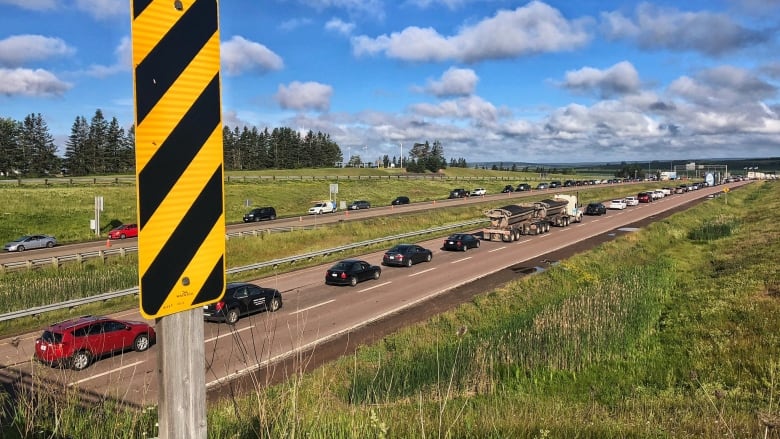Atlantic pandemic bubble travellers faced long lineups on 1st day
Maritime checkpoints busy as freer travel now underway

Atlantic Canadians are now free to travel among Canada's four eastern provinces without self-isolating to reduce the risk of coronavirus transmission, but that doesn't mean the process is easy.
The so-called Atlantic bubble opened one minute after midnight AT as part of the easing of COVID-19 pandemic restrictions. Travellers still had to wait to go through checkpoints, however.
Prince Edward Island public safety officials reported 300 to 400 vehicles crossed into P.E.I. over the Confederation Bridge within the first 90 minutes of the bubble opening. Cars then continued to cross the bridge in waves.
As of 5:30 p.m., officials said they had received more than 5,200 declarations from people wanting to come to the Island, and the number continues to rise.
Just after sunup, long lineups of vehicles could be seen at the Nova Scotia-New Brunswick border, and traffic was backed up at the New Brunswick off-ramp from the Confederation Bridge.
By 6:30 p.m. there were no lineups to enter P.E.I., as seen from the entrance checkpoint in Borden-Carleton, P.E.I. Traffic seen on a government highway camera was backed up in Amherst, N.S.
Each province has its own specific rules.
BREAKING: Major delays at the Nova Scotia / New Brunswick border, with COVID-19 self-isolation requirements lifted today, allowing Atlantic Canadians to freely travel around the region. <a href="https://t.co/ALiw9oUERs">pic.twitter.com/ALiw9oUERs</a>
—@Brett_CBCNew Brunswick is allowing commercial traffic to flow freely. Non-commercial travellers are being asked to show proof of residency, fill out a form, and answer health-screening questions. Travellers' contact information is also being collected.
People arriving on P.E.I. are being told to print and complete a form with residency and health questions filled out in advance. New Brunswick officials are reporting that process is taking a few minutes for each vehicle.
Here is <a href="https://twitter.com/BrianHigginsCBC?ref_src=twsrc%5Etfw">@BrianHigginsCBC</a> with an update on this morning’s experience at the Confederation Bridge! <a href="https://t.co/kpyHQbNKMm">pic.twitter.com/kpyHQbNKMm</a>
—@CBCPEINo form is required for Nova Scotia, but travellers are required to show proof of residency in Atlantic Canada. Commercial travellers are able to apply for a pass to be waved through checkpoints.
In Newfoundland and Labrador, two pieces of identification are required to show proof of residence in Atlantic Canada, and travellers must provide contact information. No health screening questions are being asked.
With no land connection to the rest of Atlantic Canada, things are quieter at Newfoundland and Labrador's border points. As the bubble opens, however, a petition has begun to circulate against expanding it any further.
Plenty of room on ferry
There were no long waits at the ferry between Wood Islands, P.E.I., and Caribou, N.S., on Friday, however. Some passengers told CBC News they chose the ferry to beat opening-day traffic at the bridge.
Officials with Northumberland Ferries said they have plenty of room on crossings in the days ahead, too.
Passengers are required to wear masks and are permitted to stay in their vehicles during the crossing.
"I don't want to take a chance, in case there was any germs lingering," said Joanne Adams, who said she'd remain in her car during the crossing. She was going to visit her nephew in Nova Scotia.
Lisa Martell of Halifax was just getting off the ferry and was happy to be going "home" to her family in Georgetown, but she said the crossing was unusual.
"It was just a little different, because nobody is, like, talking. Nobody's being social because they're just being cautious," she said.
Keen to travel
Rose Cooper of Wheatley River, P.E.I., was up early Friday, and heading to Miramichi, N.B.
"We're going home to visit our family. We haven't seen them for a long time," said Cooper.
"I'm especially excited to see my Mom. She's 87. It's going to be good to reconnect."

New Brunswick Public Safety Minister Carl Urquhart said the long queues are not a surprise in the early hours of the bubble, because people are anxious to move.
"They wanted to get in and get their summer started," said Urquhart.
There are currently five active cases of COVID-19 in Atlantic Canada, a region of 2.2 million people.

More from CBC News
With files from Brian Higgins

